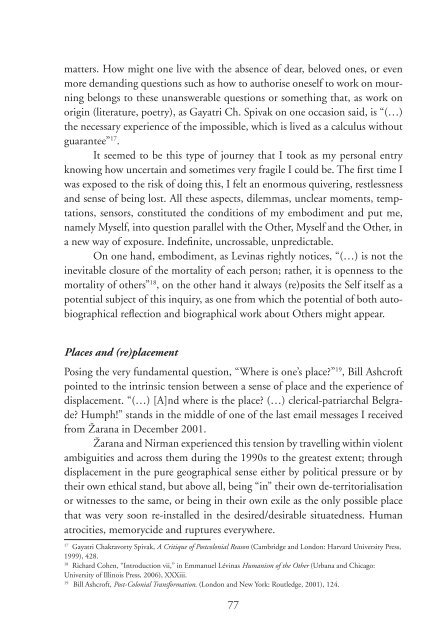Teaching Subjectivity. Travelling Selves for Feminist ... - MailChimp
Teaching Subjectivity. Travelling Selves for Feminist ... - MailChimp
Teaching Subjectivity. Travelling Selves for Feminist ... - MailChimp
You also want an ePaper? Increase the reach of your titles
YUMPU automatically turns print PDFs into web optimized ePapers that Google loves.
matters. How might one live with the absence of dear, beloved ones, or even<br />
more demanding questions such as how to authorise oneself to work on mourning<br />
belongs to these unanswerable questions or something that, as work on<br />
origin (literature, poetry), as Gayatri Ch. Spivak on one occasion said, is “(…)<br />
the necessary experience of the impossible, which is lived as a calculus without<br />
guarantee” 17 .<br />
It seemed to be this type of journey that I took as my personal entry<br />
knowing how uncertain and sometimes very fragile I could be. The first time I<br />
was exposed to the risk of doing this, I felt an enormous quivering, restlessness<br />
and sense of being lost. All these aspects, dilemmas, unclear moments, temptations,<br />
sensors, constituted the conditions of my embodiment and put me,<br />
namely Myself, into question parallel with the Other, Myself and the Other, in<br />
a new way of exposure. Indefinite, uncrossable, unpredictable.<br />
On one hand, embodiment, as Levinas rightly notices, “(…) is not the<br />
inevitable closure of the mortality of each person; rather, it is openness to the<br />
mortality of others” 18 , on the other hand it always (re)posits the Self itself as a<br />
potential subject of this inquiry, as one from which the potential of both autobiographical<br />
reflection and biographical work about Others might appear.<br />
Places and (re)placement<br />
Posing the very fundamental question, “Where is one’s place?” 19 , Bill Ashcroft<br />
pointed to the intrinsic tension between a sense of place and the experience of<br />
displacement. “(…) [A]nd where is the place? (…) clerical-patriarchal Belgrade?<br />
Humph!” stands in the middle of one of the last email messages I received<br />
from Žarana in December 2001.<br />
Žarana and Nirman experienced this tension by travelling within violent<br />
ambiguities and across them during the 1990s to the greatest extent; through<br />
displacement in the pure geographical sense either by political pressure or by<br />
their own ethical stand, but above all, being “in” their own de-territorialisation<br />
or witnesses to the same, or being in their own exile as the only possible place<br />
that was very soon re-installed in the desired/desirable situatedness. Human<br />
atrocities, memorycide and ruptures everywhere.<br />
17<br />
Gayatri Chakravorty Spivak, A Critique of Postcolonial Reason (Cambridge and London: Harvard University Press,<br />
1999), 428.<br />
18<br />
Richard Cohen, “Introduction vii,” in Emmanuel Lévinas Humanism of the Other (Urbana and Chicago:<br />
University of Illinois Press, 2006), XXXiii.<br />
19<br />
Bill Ashcroft, Post-Colonial Trans<strong>for</strong>mation. (London and New York: Routledge, 2001), 124.<br />
77

















